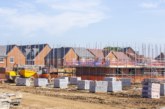
David Bainbridge, Partner Bidwells, investigates how the recent Budget could impact on housing delivery.
Budget 2018 continued the Government’s commitment to increasing housing delivery, albeit slightly overshadowed by the economic planning for Brexit.
Under the heading of Building a New Economy is the statement that: “Building more homes in the right places is critical to unlocking productivity growth and making houses more affordable.”
There is funding for infrastructure, for more affordable housing and the Housing Revenue Account cap which controls local authority borrowing for house building has been abolished. More delivery from the public sector, from registered providers of affordable housing and from small and medium sized developers, will aid delivery but it is not a short-term solution.
“The technical consultation seeks views on the standard method for assessing local housing need”
Sir Oliver Letwin’s Independent Review of Build Out was published alongside the Budget and was generally well received, although the Government does not intend to publish its response until February.
The report did not find evidence that speculative land banking is part of the business model of major housebuilders and this is not a driver of slow build out rates.
The finding is not surprising considering the pressure major housebuilders are under to improve sales and margins. Housebuilders are successful where building and selling homes, not profiting from increases in land prices, but of course this can only be done where sales volumes hold-up and more recently some housebuilders have reported reduced sales.
Planning updates
The Government surprised many by publishing a technical consultation on updates to national planning policy and guidance just ahead of the Budget and well ahead of the 6-month anniversary of publication of the new National Planning Policy Framework.
Following the trend, and now the requirement, for Local Plans to be reviewed every five years or less, it seems national policy does not even last six months.
The technical consultation, open until 7th December, seeks views on the standard method for assessing local housing need, a definition of what housing sites are deliverable for the purposes of calculating housing land supply and clarifying policy on the presumption in favour of sustainable development, where appropriate assessment is required under the Habitats Regulations.
Additional national planning guidance is expected to provide further information on the degree of planning certainty required for housing sites to count towards land supply.
Thankfully the consultation makes it clear that the 2016-based household projections, which pointed towards a future trend of reduced requirements, do not support the objective of significantly boosting the supply of new homes.
New baseline
The intention is for the 2014-based projections to provide the demographic baseline for the standard methodology for calculating local housing need, and that this calculation of need is not a mandatory target but is a starting point for local authorities.
Housing delivery needs land for housing; a commodity not being made anymore. Landowners see their land as an asset. Not all values constantly increase and any threat to land value could affect land transactions. The Government intends to review the system of planning obligations, in part, to enable local areas to capture a greater share of the uplift in land values to aid delivery of infrastructure and affordable housing.
This is a tightrope walk by Government. Whilst many would not disagree with the sentiment, there is a tipping point by which too much value capture could see the tap being slowly turned the wrong way.
The Budget, and other measures, set-out changes intended to achieve more homes in the right places, but the correct balance must be struck between ever-increasing regulation and the freedom to choose.
David Bainbridge, MRTPI, Partner, Planning at Bidwells, has 20 years’ planning experience. He has successfully delivered planning permission and land allocations for residential, industrial, leisure and mixed-use developments. David is a former Chair of the East Midlands Royal Town Planning Institute, having qualified in 1999.








